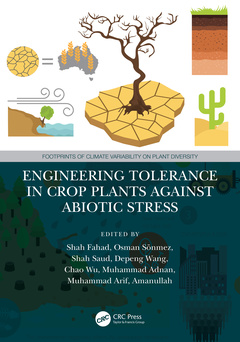Description
Engineering Tolerance in Crop Plants Against Abiotic Stress
Footprints of Climate Variability on Plant Diversity Series
Coordinators: Fahad Shah, Sönmez Osman, Saud Shah, Wang Depeng, Wu Chao, Adnan Muhammad, Arif Muhammad, Amanullah
Language: English
Subjects for Engineering Tolerance in Crop Plants Against Abiotic Stress:
Keywords
ROS Detoxification; Auxin Mediated Signalling; Abiotic Stress; Magnetic Biochar; Drought Stress; Salt Stress; Stomatal Conductance; Auxin Transport; Groundwater Depletion; Cluster Root Formation; Rice Pests; Hormonal Crosstalk; Insecticide Resistance; Indus Basin Irrigation System; Soil Greenhouse Gas; Stay Green Trait; Arbuscular Mycorrhizae; Salinity Stress; Soil Fertility; Target Site Insensitivity; Auxin Receptor Transport Inhibitor Response-1; Plant Microbe Interactions; Sea Water; Soybean Wheat Cropping Systems; Cluster Roots
· 17.8x25.4 cm · Hardback
Description
/li>Contents
/li>Readership
/li>Biography
/li>
Despite significant progress in increasing agricultural production, meeting the changing dietary preferences and increasing food demands of future populations remains a significant challenge. Salinity, drought, water logging, high temperature and toxicity are abiotic stresses that affect the crop yield and production. Tolerance for stress is a important characteristic that plants need to have in order to survive. Identification of proper techniques at a proper time can make it easy for scientists to increase crop productivity and yield. In Engineering Tolerance in Crop Plants against Abiotic Stress we have discussed the possible stresses and their impact on crops and portrayed distinctive abiotic stress tolerance in response to different techniques that can improve the performance of crops.
Features of the Book:
- Provide a state-of-the-art description of the physiological, biochemical, and molecular status of the understanding of abiotic stress in plants.
- Address factors that threaten future food production and provide potential solution to these factors.
- Designed to cater to the needs of the students engaged in the field of environmental sciences, soil sciences, agricultural microbiology, plant pathology, and agronomy.
- New strategies for better crop productivity and yield.
- Understanding new techniques pointed out in this book will open the possibility of genetic engineering in crop plants with the concomitant improved stress tolerance.
Chapter 1 Biochar: An Adsorbent to Remediate Environmental Pollutants Chapter 2 Understanding the Physiological and Genetic Responses of Plant Root to Phosphorus-Deficient Condition Chapter 3 Environmental Upheaval: Consequences and Management Strategies Chapter 4 Salinity Stress in Cotton: Adverse Effects, Survival Mechanisms and Management Strategies Chapter 5 Obstacle in Controlling Major Rice Pests in Asia: Insecticide Resistance and the Mechanisms to Confer Insecticide Resistance Chapter 6 Role of Nanotechnology for Climate Resilient Agriculture Chapter 7 Elevated CO2 in Combination with Heat Stress Influences the Growth and Productivity of Cereals: Adverse Effect and Adaptive Mechanisms Chapter 8 Molecular Mechanisms of Stress Tolerance in Plants Chapter 9 Legumes under Drought Stress: Plant Responses, Adaptive Mechanisms, and Management Strategies in Relation to Nitrogen Fixation Chapter 10 Auxin’s Role in Plant Development in Response to Stress Chapter 11 Existing Water Scarcity Scenario and Climate Change Impact on the Transboundary Water Resources in Pakistan Chapter 12 Nutrient Deficiency Stress and Relation with Plant Growth and Development Chapter 13 Agricultural Practices Can Reduce Soil Greenhouse Gas Emissions: Challenges and Future Perspectives Chapter 14 Plant-Microbial Interactions Confer Tolerance to Abiotic Stress in Plants
Dr Shah Fahad is an Assistant Professor in the Department of Agronomy, University of Haripur, Khyber Pakhtunkhwa, Pakistan. He obtained his PhD in Agronomy from Huazhong Agriculture University, China, in 2015. After doing his postdoctoral research in Agronomy at the Huazhong Agriculture University (2015–17), he accepted the position of Assistant Professor at the University of Haripur. He has published over 270 peer-reviewed papers (Impact factor 810.45) with more than 240 research and 30 review articles, on important aspects of climate change, plant physiology and breeding, plant nutrition, plant stress responses and tolerance mechanisms, and exogenous chemical priming-induced abiotic stress tolerance.
Prof. Dr. Osman Sönmez is a Professor in the Department of Soil Science, Faculty of Agriculture, Erciyes University, Kayseri, Turkey. He obtained his MS and PhD in Agronomy from Kansas State University, Manhattan-KS, USA in 1996-2004. In 2014 he accepted the position of Associate Professor at the University of Erciyes. Since 2014, he has worked in Department of Soil Science, Faculty of Agriculture at Erciyes University. He has published over 90 as peer-reviewed papers, research and review articles on soil pollution, plant physiology and plant nutrition.
Dr. Shah Saud received his Ph.D. in Turf grasses (Horticulture) from Northeast Agricultural University, Harbin, China. He is currently working as a Post Doctorate researcher in department of Horticulture, Northeast Agricultural University, and Harbin, China. Dr. Shah Saud has published over 125 research publications in peer-reviewed journals.
Dr. Depeng Wang has completed Ph.D. in 2016 in the field of Agronomy and Crop Physiology from Huazhong Agriculture University, Wuhan, China. He is currently serving as a professor at the College of Life Science, Linyi University, Linyi, China. He is the principal investigator of Crop Genet




